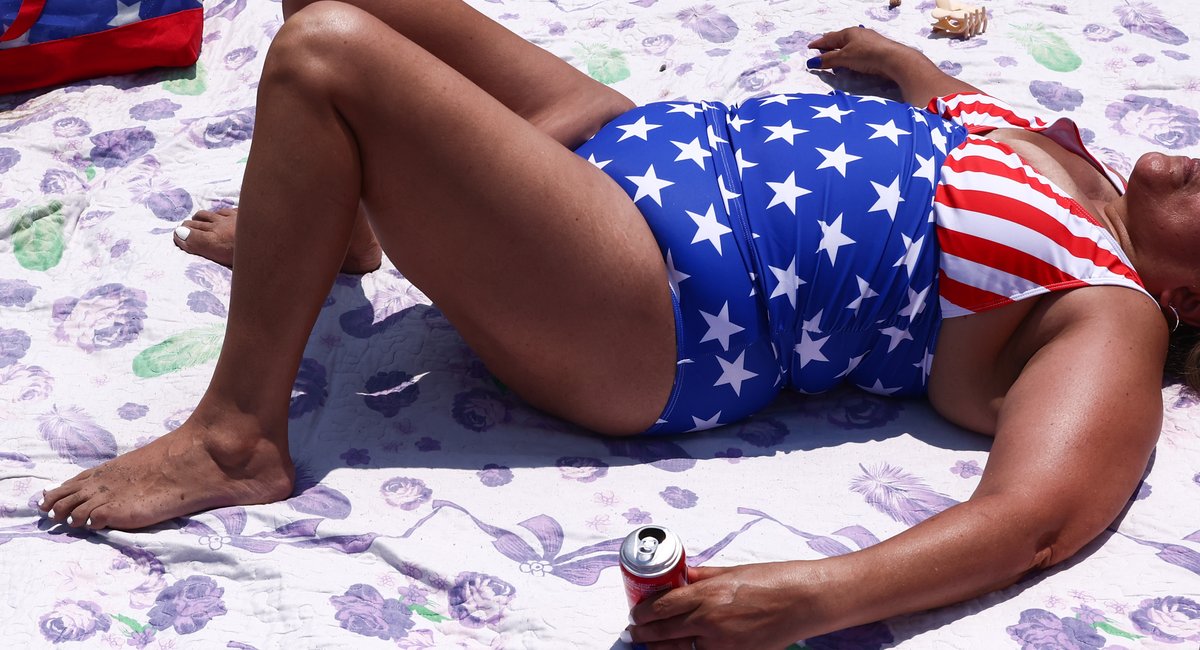New Yorkers enjoying cold beers and nutcrackers this summer were smacked with $25 fines in the city’s latest crackdown on low-level crimes: public drinking.
Police issued close to 7,000 tickets in June alone — up from the 4,000 or so in the same month last year. It’s the most tickets police have issued in a single month since at least 2019, according to a Gothamist analysis of data from the city’s office of Administrative of Trials and Hearings.
Public drinking tickets have more than doubled under Mayor Eric Adams — from about 17,000 in 2019 to nearly 40,000 in 2023. It’s part of what police have said is a larger crackdown by Adams and the NYPD to enforce low-level crimes, including public drinking, public urination, littering, excessive noise and turnstile jumping.
Police have written up New Yorkers drinking in parks, on street corners and even on the city’s beaches, which have long been a gathering place for day drinkers and nutcracker sellers alike. On Coney Island Beach, Brighton Beach and their surroundings, for example, data shared with Gothamist shows police officers wrote at least 60 tickets for public drinking and having open containers in June and July — up from just a handful in past summers.
Drinking in public has been illegal in New York City since 1979, but that hasn’t stopped New Yorkers from drinking outside. It’s a historically beloved use of public space, especially during the early pandemic, when bars and restaurants were allowed to sell to-go cocktails, and the data shows few tickets were written.
A New Yorker ticketed for public drinking can plead guilty by mail within 10 days to avoid appearing in court.
The NYPD declined to answer questions about the reason for the spike in tickets, except to say that officers enforce the law when they see that it is being violated.
Beachgoers at Coney Island in late August said they think the enforcement amounts to a cash grab.
“It’s just a new way for the city to collect money,” Teresa Bazzi said.
“Drinking doesn’t mean you’re going to become a wild, crazy person who attacks other people,” she said. Drinking a beer on a sunny afternoon didn’t concern Bazzi, her friend Elena Brollo, and half a dozen other beachgoers interviewed by Gothamist. Brollo said she’d rather see police enforce littering laws on the beach.
But Jill Snider, a former NYPD officer and current adjunct lecturer at John Jay College of Criminal Justice, said public drinking can lead to more serious crimes.
“If you let people drink in the streets all day, you’re coming back later at night to fights and gunfire,” Snider said.
“When people get drunk and agitated and it’s summertime, most often it doesn’t end well,” she said. And she added that enforcing public drinking laws helps keep swimmers safe from drowning.
Historically, data shows that Black and Latino New Yorkers are disproportionately ticketed for low-level crimes. Roughly 90% of fare jumping tickets from 2016 to 2023 went to Black and Latino New Yorkers, according to a Gothamist analysis. The New York Post reported that 9 out of 10 public drinking tickets issued during the first quarter of 2023 were issued to Black or Hispanic New Yorkers.
“How is it a criminal matter that someone has a beer on the beach? A glass of wine in the park? A beer on their stoop?” said Michael Sisitzky, assistant policy director with the New York Civil Liberties Union.
“This is not actually improving the lives of New Yorkers,” he said. “It’s just making it that much harder for the communities that disproportionately bear the brunt of broken windows policing to have the ability to thrive in this city.”
One scorching Saturday in July, scantily clad hipsters strewn on Rockaway beach sipped nutcrackers, boardwalk beer and wine from plastic flutes. A trio of comparatively overdressed police officers began patrolling the sand, issuing $25 tickets for drinking in public. A passionate swimmer then cursed the officers out as the crowd cheered.
In 2013, former Mayor Bill de Blasio said in a mayoral debate that New Yorkers should be allowed to drink on their stoops. The city council then introduced a package of bills in 2016 known as the Criminal Justice Reform Act, intended to decriminalize low-level crimes like public drinking. Police began issuing tickets for such crimes rather than arresting people.
In 2017, de Blasio’s office announced that police issued 90% fewer criminal summonses for these “quality of life” crimes. The Manhattan District Attorney’s office said at the time the initiative would keep as many as 10,000 New Yorkers out of jail each year.
